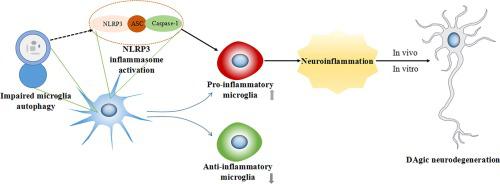当前位置:
X-MOL 学术
›
Brain Behav. Immun.
›
论文详情
Our official English website, www.x-mol.net, welcomes your
feedback! (Note: you will need to create a separate account there.)
Impaired autophagy in microglia aggravates dopaminergic neurodegeneration by regulating NLRP3 inflammasome activation in experimental models of Parkinson’s disease
Brain, Behavior, and Immunity ( IF 8.8 ) Pub Date : 2021-01-01 , DOI: 10.1016/j.bbi.2020.10.010 Yue Qin , Jingru Qiu , Ping Wang , Jia Liu , Yong Zhao , Fan Jiang , Haiyan Lou
Brain, Behavior, and Immunity ( IF 8.8 ) Pub Date : 2021-01-01 , DOI: 10.1016/j.bbi.2020.10.010 Yue Qin , Jingru Qiu , Ping Wang , Jia Liu , Yong Zhao , Fan Jiang , Haiyan Lou

|
Microglia-mediated inflammation plays an important role in the pathogenesis of several neurodegenerative diseases including Parkinson's disease (PD). Recently, autophagy has been linked to the regulation of the inflammatory response. However, the potential role of microglial autophagy in the context of PD pathology has not been characterized. In the present study, we investigated whether impaired microglial autophagy would affect dopaminergic neurodegeneration and neuroinflammation both in vivo and in vitro. In vitro, BV2 microglial cells were exposed to LPS in the presence or absence of autophagy-related gene 5 (Atg5) small interference RNA (Atg5-siRNA). For in vivo study, microglial Atg5 conditional knockout (Atg5flox/flox; CX3CR1-Cre) mice and their wild-type littermates (Atg5flox/flox) were intraperitoneally injected with MPTP to induce experimental PD model. Our results revealed that disruption of autophagy by Atg5-siRNA aggravated LPS-induced inflammatory responses in BV2 cells and caused greater apoptosis in SH-SY5Y cells treated with BV2 conditioned medium. In mice, impaired autophagy in microglia exacerbated dopaminergic neuron loss in response to MPTP. The mechanism by which the deficiency of microglial autophagy promoted neuroinflammation and dopaminergic neurodegeneration was related to the regulation of NLRP3 inflammasome activation. These findings demonstrate that impairing microglial autophagy aggravates pro-inflammatory responses to LPS and exacerbates MPTP-induced neurodegeneration by modulating NLRP3 inflammasome responses. We anticipate that enhancing microglial autophagy may be a promising new therapeutic strategy for PD.
中文翻译:

帕金森病实验模型中小胶质细胞自噬受损通过调节 NLRP3 炎症小体激活加重多巴胺能神经变性
小胶质细胞介导的炎症在包括帕金森病 (PD) 在内的几种神经退行性疾病的发病机制中起着重要作用。最近,自噬与炎症反应的调节有关。然而,小胶质细胞自噬在 PD 病理背景下的潜在作用尚未得到表征。在本研究中,我们研究了受损的小胶质细胞自噬是否会影响体内和体外的多巴胺能神经变性和神经炎症。在体外,BV2 小胶质细胞在存在或不存在自噬相关基因 5 (Atg5) 小干扰 RNA (Atg5-siRNA) 的情况下暴露于 LPS。对于体内研究,小胶质细胞 Atg5 条件性敲除 (Atg5flox/flox; CX3CR1-Cre) 小鼠及其野生型同窝仔 (Atg5flox/flox) 腹腔注射 MPTP 以诱导实验性 PD 模型。我们的结果表明,Atg5-siRNA 对自噬的破坏加剧了 BV2 细胞中 LPS 诱导的炎症反应,并在 BV2 条件培养基处理的 SH-SY5Y 细胞中引起了更大的细胞凋亡。在小鼠中,小胶质细胞自噬受损加剧了多巴胺能神经元对 MPTP 的反应。小胶质细胞自噬缺陷促进神经炎症和多巴胺能神经变性的机制与调控NLRP3炎症小体激活有关。这些发现表明,损害小胶质细胞自噬会加剧对 LPS 的促炎反应,并通过调节 NLRP3 炎症小体反应加剧 MPTP 诱导的神经变性。
更新日期:2021-01-01
中文翻译:

帕金森病实验模型中小胶质细胞自噬受损通过调节 NLRP3 炎症小体激活加重多巴胺能神经变性
小胶质细胞介导的炎症在包括帕金森病 (PD) 在内的几种神经退行性疾病的发病机制中起着重要作用。最近,自噬与炎症反应的调节有关。然而,小胶质细胞自噬在 PD 病理背景下的潜在作用尚未得到表征。在本研究中,我们研究了受损的小胶质细胞自噬是否会影响体内和体外的多巴胺能神经变性和神经炎症。在体外,BV2 小胶质细胞在存在或不存在自噬相关基因 5 (Atg5) 小干扰 RNA (Atg5-siRNA) 的情况下暴露于 LPS。对于体内研究,小胶质细胞 Atg5 条件性敲除 (Atg5flox/flox; CX3CR1-Cre) 小鼠及其野生型同窝仔 (Atg5flox/flox) 腹腔注射 MPTP 以诱导实验性 PD 模型。我们的结果表明,Atg5-siRNA 对自噬的破坏加剧了 BV2 细胞中 LPS 诱导的炎症反应,并在 BV2 条件培养基处理的 SH-SY5Y 细胞中引起了更大的细胞凋亡。在小鼠中,小胶质细胞自噬受损加剧了多巴胺能神经元对 MPTP 的反应。小胶质细胞自噬缺陷促进神经炎症和多巴胺能神经变性的机制与调控NLRP3炎症小体激活有关。这些发现表明,损害小胶质细胞自噬会加剧对 LPS 的促炎反应,并通过调节 NLRP3 炎症小体反应加剧 MPTP 诱导的神经变性。











































 京公网安备 11010802027423号
京公网安备 11010802027423号